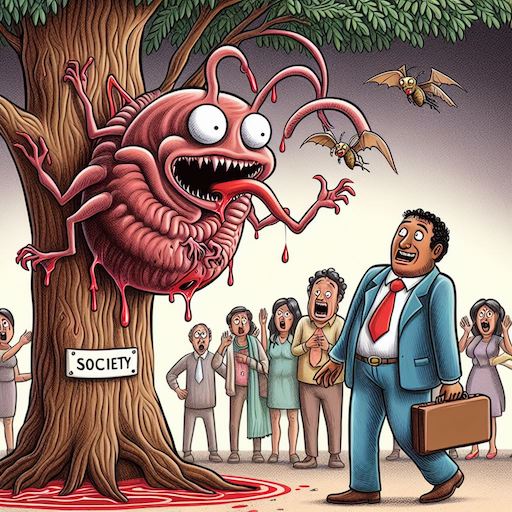On being parasitical

Introduction
“Parasitical” is a derogatory term and it means “habitually relying on exploiting others”. The incentive for being parasitical is to gain personal wealth, power or otherwise, but this comes at the expense of others’ rights, well-being and such.
Unlike biological parasites, humans (generally) possess moral agency, enabling them to understand the consequences of their actions.
Examples:
- Piracy: Enjoying a movie without paying for it.
- Workplace Slacking: Avoiding effort while still receiving payment.
- Political Budget Abuse: Profiting at the expense of constituents.
An important observation is that as parasites multiply, the system breaks down:
- If everyone pirates movies, the film industry collapses.
- If every employee slacks off, companies go bankrupt.
- If every politician abuses budgets, governmental dysfunction ensues.
However, a system with no parasites at all is not ideal; antifragile systems thrive on stressors.
Population size
The population size of the environment influences the sustainability of parasitical behavior:
- In a large corporation, one can slack off undetected, but this is less feasible in a small startup.
- A skilled corrupt politician can take a very small cut on a large budget for an entire state, but in a small town the same volume of fraud is more likely to be noticed.
- Anonymity in a large city facilitates the abuse of public services; this would be noticeable in a small town.
It’s no surprise that founders and engaged managers often prefer small teams, and well-managed states tend to have smaller populations.
Parasites hide in numbers. Smart parasites navigate the immune response of systems, allowing them to persist.
Morality
While parasitical behavior seems inherently immoral, the reality is that we are all parasitical in various ways:
- Animal cruelty for taste preferences.
- Child labor for cheaper goods.
- Ignoring systemic issues (e.g. inequality, climate collapse) for personal comfort.
Being indirectly parasitical is not morally superior; it exploits others equally for the same gain. The question is, where do we draw the line on acceptable parasitical behavior?
Finally, institutionalized parasitical behavior, like exploitative professions and businesses, seem to amplify the immorality.
Being less parasitical
Can societies become less parasitical? Individuals may reject parasitical behavior due to:
- Altruism
- Feeling of being independent
- Reputation concerns
For those ingrained in parasitical societies, change is challenging.
It seems that less parasitical societies are fragile and must be protected.
To foster less parasitical behavior:
- Improve well-being: give people bandwidth to care about others.
- Keep communities small for visibility.
- Leverage technology for oversight.
Cognitive dissonance & rationalisation
If people desire less parasitical surroundings but still engage in parasitical behavior, cognitive dissonance or rationalization may be at play.
Rationalization branches into two types:
- Prideful Parasites: Those who enjoy exploiting others without seeing it as “bad”.
- Necessity Parasites: Those who believe it’s wrong but justify it for achieving personal goals, which needn’t be selfish nor extravagant.
The latter group often views the system as broken, making parasitical behavior necessary. At the same time, they will often be hard-working and just as loving as your closest family member.
Conclusion
In conclusion, we all exhibit parasitical behaviors to varying degrees. Considering where to draw the line for acceptable parasitical behavior prompts introspection.
Where do you draw the line?